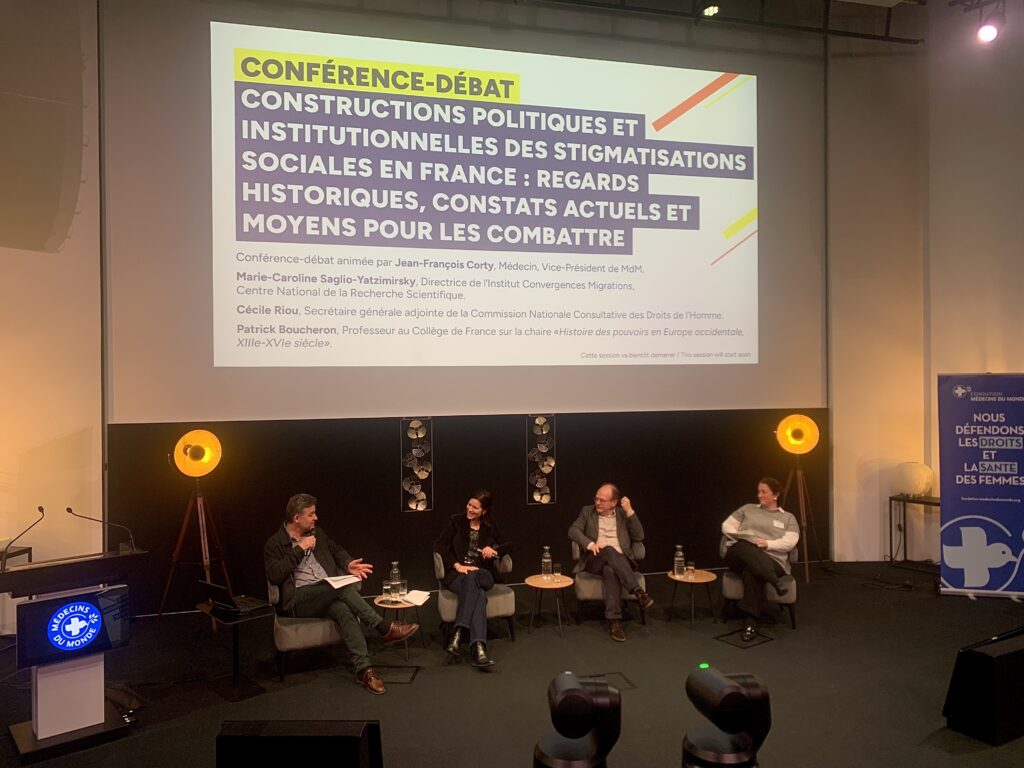Last Thursday, the ninth edition of the Scientific Day on Humanitarian Health, supported by the Fondation Médecins du Monde, was held in the auditorium of the newspaper Le Monde. The French Red Cross Foundation, of course, once again answered the call. Here we look back at the rich and highly topical collective discussions on the links between health policies, disadvantaged groups, humanitarian aid and institutions. More than ever, research has a key role to play in these discussions.

Photo credit : @ Maya Sensoy | French Red-Cross Foundation
Access to healthcare is a real obstacle course for people living in precarious conditions, and has long been mythologised by the media and the political establishment, making it essential to understand it through action research. With this in mind, and in order to place access to healthcare for disadvantaged groups in its multiple realities, from its institutional dimension to its human dimension, the Fondation Médecins du Monde has taken the initiative of encouraging dialogue between researchers, professionals, operational staff, healthcare professionals and voluntary and institutional players.
Structured around three round tables and a conference debate, this dialogue was also an opportunity to question the scales of action research, its networking, paradigms, methods and its capacity to disseminate and shape the action of humanitarians and public authorities.
After the first highlight of the day in the form of a testimonial offering an uncompromising insight into the unspeakable problems of access to healthcare for asylum seekers, we were able to follow a valuable perspective on state medical aid (AME), given by Agnès Gillino (General Coordinator Nice, MdM) and Paul Dourgnon (Director of Research, Institut de Recherche et de Documentation en Économie de la Santé), before looking at the impact of the transition of mutual insurance from the communal to the departmental level in Senegal, an original and new experience described by Valéry Ridde and which opens up new prospects for universal health cover.
The subject of the second round table was the empowerment of people, which is central to the emancipation of disadvantaged groups, as it is in the humanitarian field, reinforcing the acceptability of local initiatives and making them sustainable. This was highlighted by the presentation of three highly innovative research projects.
From Mayotte, Charlotte Thoury (Project Manager for the health mediation programme in Mayotte) was able to present her research based on participatory mapping. With its emphasis on the ‘action’ dimension of action research, this research project then gave rise to ‘post-mapping workshops’ involving the residents of the shanty town studied, followed by community health micro-projects selected and implemented by these same residents.
Another example of participatory research-action with an innovative and growing methodology, Emilie Labeyrie (clinical psychologist) unveiled her research on Narrative Exposure Therapy (NET) built around a ‘photovoix’ (photovoice) consisting in the taking of photographs by the communities studied in order to establish a community diagnosis and to participate in the implementation of solutions towards social change.
Marie Thibaud brought the round table to a close with a speech on behalf of the Collectif Stop aux Cancers de nos Enfants (Stop Our Children’s Cancers Collective), which has made research a central part of its work by setting up the Institut Citoyen de Recherche et de Prévention en Santé environnementale (Citizen’s Institute for Environmental Health Research and Prevention).
A conference-debate bringing together Jean-François Corty (Doctor, Vice-President of MdM), Marie-Caroline Saglio-Yatzimirsky (Director of the Convergences Migrations Institute), Cécile Riou (Deputy General Secretary of the National Consultative Commission on Human Rights) and Patrick Boucheron (Professor at the Collège de France in the ‘History of Power in Western Europe, XIIIe-XVIe siècle’) then discussed the pre-eminence of social stigmatisation and prejudice in political and media discourse, and the concomitant sidelining of scientific productions of the latter.
Finally, the Day ended with a presentation of a range of innovative approaches to serving populations far removed from healthcare systems. To find out more, and if this foretaste has aroused your curiosity, don’t hesitate to visit the Médecins du Monde YouTube channel, which will soon be publishing the video recording of the Day, which the French Red Cross Foundation was delighted to attend.
Photo credit (top photo): @Médecins du Monde





